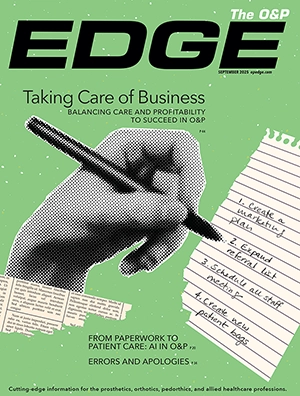On July 23, the National Association for the Advancement of Orthotics and Prosthetics (NAAOP) hosted its first in-person Congressional Fly-In, bringing together advocates, professionals, and leaders from across O&P for intensive policy engagement in Washington. The event was made possible through the generous financial and in-kind support of OPGA.
Turnout Delivers Substantial Impact
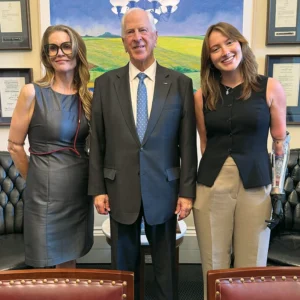
The fly-in demonstrated strong O&P community commitment through substantial participation. NAAOP board members, O&P leaders, and all eight of the NAAOP Breece Fellows were invited to attend based on the key committees of their congressional representatives. In all, 33 participants organized into nine strategic groups and conducted 63 meetings with congressmembers and congressional staff in a single day. This represented a significant investment in advancing policy priorities that directly affect O&P patients and the providers who serve them.
The day before the meetings, the event opened with a training session where attendees discussed policy priorities and refined talking points to ensure consistent, effective messaging. NAAOP hosted a political fundraiser to honor Congressman Glenn “G.T.” Thompson (R-PA), a long-standing leader on O&P issues in the House who is the O&P champion for the Medicare O&P Patient-Centered Care Act. The event brought together advocates from across the rehabilitation community, including the American Orthotic and Prosthetic Association (AOPA) Political Action Committee (PAC), Powers PAC, the Physical Therapy PAC, the Occupational Therapy PAC, the Rehabilitation Hospital PAC, and individual contributors, demonstrating broad coalition support for this important bill and these critical O&P issues.
The morning of the event, the nine participant groups took to Capitol Hill for intensive advocacy, with the most active groups conducting eight to ten congressional meetings.
Meetings focused strategically on legislators in participants’ home states and districts, staff of members serving on committees with relevant jurisdiction, key leaders on NAAOP’s priority issues, and congressmembers who champion disability community causes. This targeted approach ensured advocacy efforts reached the most influential O&P legislative policy decision-makers.
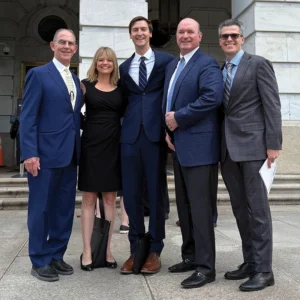
NAAOP’s mission drove the day’s activities: “To be a strong, unifying advocate, representing the interests of the O&P patient and practice communities specifically championing causes concerning patient access, funding, and outcomes through leadership in national and state policy formation.” In addition to OPGA, AOPA leadership, and representatives of O&P practices, manufacturers, and suppliers, and especially, patients, contributed to the success of the fly-in.
Advancing the Medicare O&P Patient-Centered Care Act
The primary advocacy focus centered on the newly introduced Medicare O&P Patient-Centered Care Act, H.R. 4475 in the House and S. 2329 in the Senate. The fly-in was the impetus for the House and Senate to reintroduce the bill in the 119th Congress. NAAOP has been working in close coordination with AOPA, and companion legislation was introduced in both the House and Senate on July 17.
The timing proved particularly relevant given the US Department of Justice’s announcement on June 30 of the largest healthcare fraud takedown in US history, which highlighted ongoing criminal abuse of the Medicare program, including orthotic benefits. Over $14 billion was recovered and 350 people arrested in a set of international schemes to defraud Medicare. In addition, the Centers for Medicare & Medicaid Services (CMS) announced its intention to proceed with a new round of competitive bidding for off-the-shelf (OTS) orthotic devices in the coming years. These developments make the provisions of the Patient-Centered Care Act even more relevant than in recent years. This context underscored the urgency of legislative reform to protect both patients and legitimate O&P providers.

The bill proposes three key reforms. First, it would exempt certified and licensed orthotists and prosthetists from competitive bidding requirements for OTS orthoses, allowing them to provide OTS orthoses at the point of service, whether or not they have a competitive bidding contract with the Medicare program. In this manner, credentialled O&P clinicians would be able to provide all patients with OTS orthoses at the competitive bidding rate, just like physicians and therapists. Second, it would prohibit drop shipping of custom orthoses and all prostheses so that patients would not go without the in-person clinical care they need, helping reduce fraud while ensuring appropriate treatment. Third, it would require Medicare coverage for medically necessary orthotic replacements regardless of the arbitrary five-year “reasonable useful lifetime” rule, aligning orthotic policy with prosthetic coverage.
Fly-in participants met with all of the bill’s original sponsors, including Representatives G.T. Thompson, Mike Thompson (D-CA), Gus Bilirakis (R-FL), and Debbie Dingell (D-MI), and Senators Steve Daines (R-MT) and Mark Warner (D-VA). These meetings allowed advocates to express appreciation for their leadership on this critical patient access legislation and plot next steps in the legislative process.
Opposing Competitive Bidding Expansion
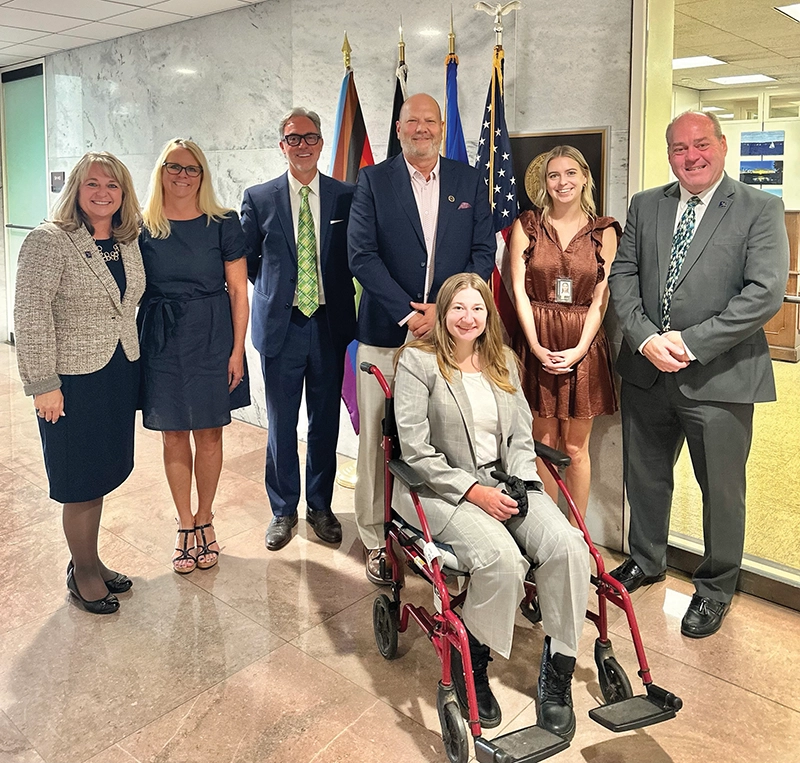
Advocates also urged Congress to oppose CMS’ proposed expansion of Medicare competitive bidding to include additional OTS orthoses. CMS recently issued a proposed rule to restart competitive bidding for durable medical equipment, prosthetics, orthotics, and supplies (DMEPOS), including a second round for OTS orthotics. Participants explained how competitive bidding eliminates the clinical care essential to quality orthotic treatment since OTS orthotic devices are typically shipped directly to patients’ homes. This practice is the only way suppliers can make ends meet under significantly reduced reimbursements rates, reducing quality, eliminating patient choice, and decreasing access to appropriate clinical care. Because public comments were due August 29, the congressional meetings provided timely opportunities to discuss the policy’s potential negative impacts on patient care and generate opposition to the proposal before the comment deadline.
The Connection Between Limb Loss, Mobility, and Obesity
Advocates discussed the critical connection between limb loss, mobility, and obesity, supporting the Treat and Reduce Obesity Act (H.R. 4231/S. 1973). This legislation would expand Medicare coverage for antiobesity medications, directly relating to limb loss prevention efforts.
Medicare beneficiaries with limb loss and mobility-related disabilities face significant barriers to maintaining a healthy weight, which helps prevent a variety of chronic health conditions. These barriers include lack of coverage for activity-specific prostheses and orthoses, inaccessible fitness facilities, limited physical activity options, chronic pain, and compounding health conditions. These factors contribute to high rates of obesity and related comorbidities in this population.
Expanding access to antiobesity medications, combined with healthy diet approaches, provides an important clinical tool for improving health outcomes and supporting long-term independence for people with disabling mobility impairments.
Protecting Outcomes Research and Critical Federal Funding
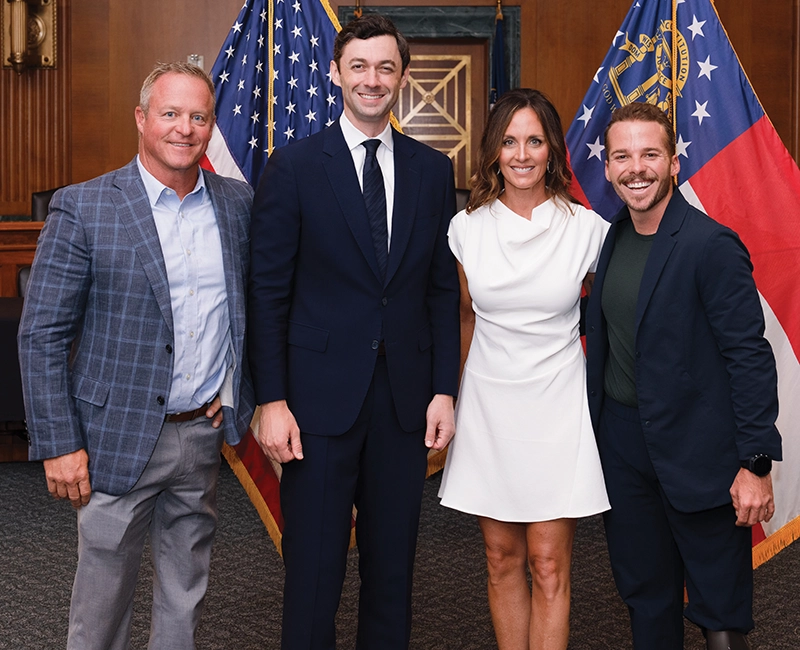
Advocacy efforts included requests for Congress to appropriate $15 million in fiscal year (FY) 2026 to fund the Orthotics and Prosthetics Outcomes Research Program (OPORP) run by the Department of Defense’s Congressionally Directed Medicare Research Program (CDMRP). A secondary request was to ensure continued eligibility for O&P outcomes research under the CDMRP’s Peer-Reviewed Medical Research Program, another program that funds combat-related research.
Established by Congress in FY 2014, OPORP supports research to improve health outcomes and well-being for individuals with limb loss or limb impairment. This research provides the foundation for clinical advances that directly benefit patients. The program contributed over $120 million to O&P researchers throughout the country but was not funded in FY 2024. NAAOP is working with its O&P Alliance partners to help restore funding for this program.
Participants also advocated for protecting funding for programs under the Administration for Community Living, including the Amputee Coalition’s Limb Loss Resource Center, which serves as a vital resource hub and connection point for individuals with limb loss and limb difference.
Professional Advocacy in Action
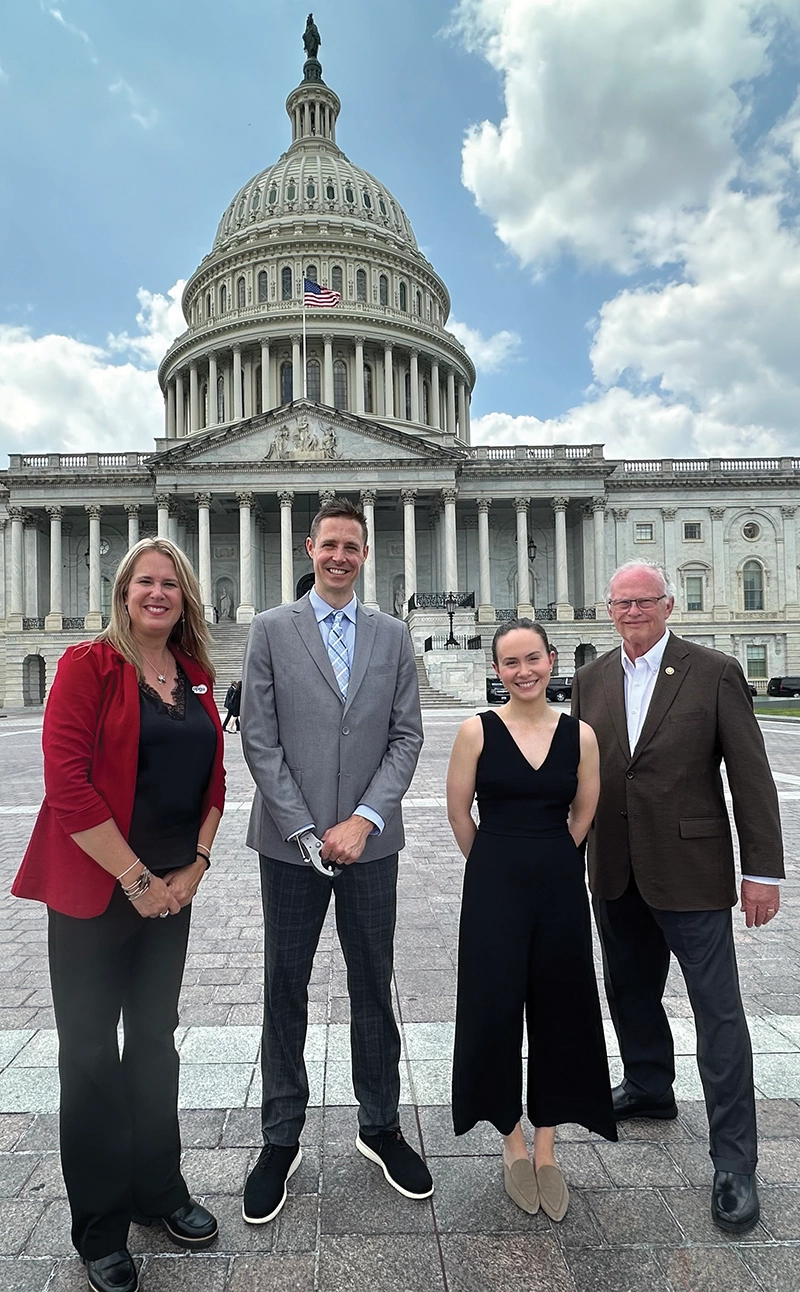
The day of congressional meetings demonstrated the effectiveness of well-prepared, personal advocacy. Participants brought professional expertise and patient stories to policy discussions, helping legislators and staff understand the real-world implications of these issues. The combination of clinical knowledge and personal experience created compelling narratives that moved beyond abstract policy concepts to concrete impacts on patient care, resulting in meaningful impressions made on congressional leaders and staff.
Legislative leaders proved receptive to NAAOP’s advocacy messages. Those who had previously cosponsored the O&P Patient-Centered Care Act expressed interest in continued support for its reintroduction, while new offices showed interest in learning about O&P issues. Several offices expressed particular interest in the antiobesity medications connection to limb loss, recognizing it as a topic gaining significant attention in broader healthcare policy conversations.
Fellowship Luncheon: Honoring Current and Future Leaders
The NAAOP Fly-In was preceded by the Fellowship Luncheon, celebrating the George and Dena Breece Fellowship program and honoring 2025 Breece Fellow Annika Berlin. The George and Dena Breece Fellowship is a paid, nine-week summer program based in Washington, designed to educate emerging leaders about O&P policy and advocacy within the broader context of rehabilitation and disability policy issues. Berlin is the eighth Breece Fellow to participate in this transformative O&P leadership development program.
The luncheon brought together O&P professionals and leadership from O&P Alliance member organizations, including the American Academy of Orthotists and Prosthetists, the Board of Certification/Accreditation, the American Board for Certification in Orthotics, Prosthetics and Pedorthics, and the National Commission for Orthotic and Prosthetic Education.
The attendance of the previous Breece Fellows was a highlight of the luncheon, creating opportunities for connection and sharing advocacy experiences among current and emerging leaders. The fellowship program has become a cornerstone for developing advocacy leadership, with fellows going on to influential roles throughout the O&P and broader disability advocacy profession.
“This was my first time doing anything like this on the Hill, and it was truly eye-opening,” said Berlin about the advocacy experience. “I care so deeply about the disability community and ensuring that people with disabilities are truly at the center of decisions that impact their lives and care. I believe that the voices and experiences of people with disabilities should be driving these conversations, not just receiving whatever gets decided for them. Being there in person really drove home how much this work matters. We met with congressional offices that had completely different levels of understanding—some knew nothing about O&P, others were very knowledgeable. It made me realize how essential it is that we’re there having these conversations.
“Through the fellowship, I’ve started to see how these policies actually affect real people’s lives. Before, they felt more abstract to me, but now I understand how much is really at stake. If we’re not there speaking up for the O&P issues that impact patients, they just get overlooked. We have to keep showing up and making sure our voices are heard.”
The program’s lasting impact is exemplified by previous fellows, including Lucas DeLuca, the 2022 fellow who now serves as director of digital accessibility for Colorado Springs. DeLuca’s participation in this year’s event demonstrated the program’s success in creating lifelong advocates. As DeLuca reflected, “I attended this year’s Congressional Fly-In to speak to the need for better access and care for people with disabilities—something that hits close to home for me. As an amputee, I’ve personally struggled to get the care I needed, and I know I’m not alone. That experience is what drives me to push for change, not just for myself, but for the wider disability community.”
Celebrating George Breece, NAAOP Founding Executive Director
The luncheon also served as a special celebration of NAAOP Executive Director George Breece, who will be retiring later this year. As NAAOP’s founding executive director, Breece has led the organization since its inception in 1987 with consistency and commitment, building it into a leading voice in O&P policy and advocacy and serving as an incubator for future O&P leaders.
Attendees recognized his decades of work in establishing and implementing NAAOP’s mission and expanding its influence in policy discussions that impact the limb-loss and limb-difference community. The timing of this milestone celebration during NAAOP’s first in-person fly-in seemed particularly fitting, as his legacy extends beyond organizational leadership to encompass his support of emerging advocates through the George and Dena Breece Fellowship Program.
Continuing Advocacy Momentum
The success of the in-person meetings creates important opportunities for sustained advocacy engagement. NAAOP continues to build on these conversations to advance the legislative priorities discussed, with particular urgency around opposing the CMS competitive bidding expansion to OTS orthotics.
Follow-up communications with congressional offices will be critical to maintaining the relationships established during the meeting and keeping pressure on legislators for support on these key issues. The personal connections made during face-to-face meetings provide refreshed dialogue as these policy priorities move through the legislative process.
In addition to Medicare competitive bidding, the recent reintroduction of the Medicare O&P Patient-Centered Care Act provides an immediate opportunity for continued congressional engagement. NAAOP encourages all members of the O&P community to visit the Congressional Action Center at naaop.org to easily contact your senators and representatives seeking cosponsorship of this important legislation. Sustained advocacy from constituents reinforces the messages delivered during the fly-in meetings and year-round advocacy by NAAOP staff and supports NAAOP’s overall congressional outreach efforts.
Peter W. Thomas, JD, is general counsel for the National Association for the Advancement of Orthotics and Prosthetics (NAAOP) and counsel to the O&P Alliance.
Annika Berlin, MS, is NAAOP’s 2025 George and Dena Breece Fellow.
Featured: Skórzewiak/stock.adobe.com


